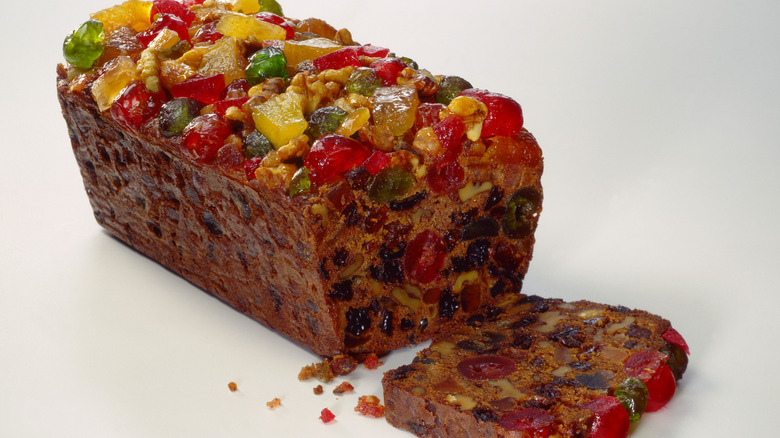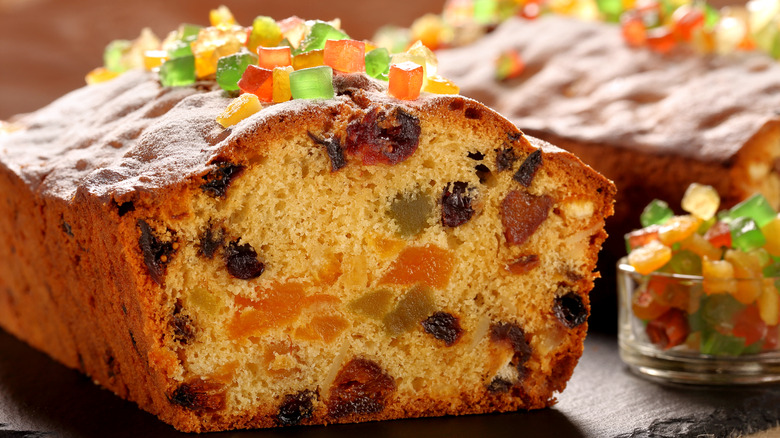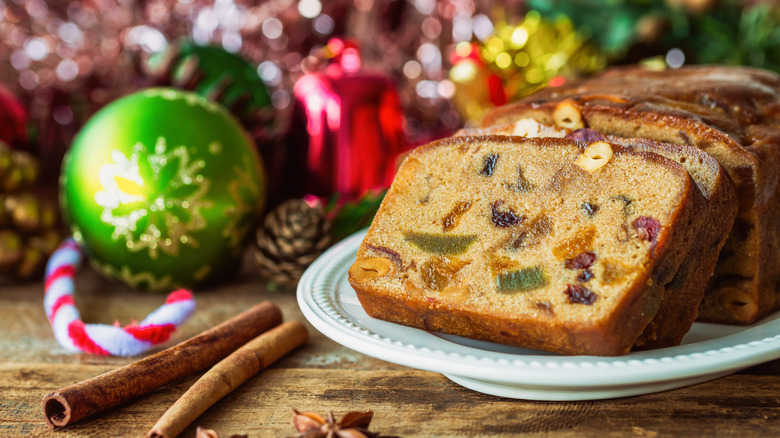The Science Behind Why Fruitcake Lasts So Long
You're digging around in your kitchen cabinet, doing some spring cleaning. As you toss boxes of opened food and spices that have solidified into a single block, you come across a half-eaten fruitcake, still wrapped in its plastic. It doesn't look too bad for what it's worth. In fact, it looks almost fresh. That makes sense, you think, Christmas wasn't too long ago, right? It's only when you look at the expiration date on the fruitcake that you learn it is from Christmas — of 2018.
Fruitcake is exactly what it sounds like: a cake made with dried fruit, usually combined with nuts and spices. PBS tells us this pastry goes back centuries, even dating back to the days of the ancient Romans, who made a very early version of it out of honey, wine, barley, and dried fruit seeds to feed soldiers. While some people view the fruitcake as a sign of the warmth and cheer of the Christmas season, others view it more or less as a joke, even going so far as to describe it more as a "doorstop" than a cake you eat (via HuffPost). But whether you eat it, bake it, or just don't plain like it all, fruitcake's most fascinating trait is that it has an incredibly long shelf life. One fruitcake, according to the World Record Academy, is 143 years old and shows no signs of decay or rot whatsoever.
How can a cake of fruit and nuts last over a century?
Fruitcake is preserved thanks to denaturation
If you were to let a fruit-based cake sit in the back of your cabinet for a year, chances are the resulting end product would be something that you couldn't exactly put into words without gagging. How can a fruitcake, then, last so long?
According to Mental Floss, this is thanks to the process known as denaturation. Denaturation is the process in which the molecular structure of a protein changes, thus changing how the protein functions. One of the main ingredients in fruitcake is alcohol, which helps to kill off bacteria and prevent mold from growing on it. The alcohol changes the protein of the cells in the fruitcake, thus preventing any sort of changes or growth to the cake itself. The alcohol, in a way, preserves the fruitcake by preventing any mold or decay from growing on it.
King Arthur Baking also explains that the dried or candied fruit in the fruitcake also has little to no water. Unlike a fresh piece of fruit, these dried fruits have no moisture to lose and thus cannot decay like normal fruits. A good example of this is putting a box of raisins near a carton of fresh grapes and letting them sit out. The grapes lose moisture and wilt, while the raisins remain perfectly edible.
Does fruitcake get better with age?
You may have heard the old saying that wines get better with age. It's why you pay a few grand for a bottle of wine from the 1940s. But what about fruitcake? Does this dense, heavy piece of cake actually get better the more it sits out?
According to ABC News, some argue that fruitcakes actually do get better with age thanks to the dried fruit. The reasoning goes that the tannins inside the fruit "age" in a manner similar to how the tannins in a barrel of wine "age." At time passes, the tannins release "new flavor compounds," which supposedly add a much richer and more complex flavor to the fruitcake. A fresh fruitcake may have a milder flavor compared to a fruitcake you've kept in your basement freezer for about two years, while the older fruitcake may have a nuttier, deeper flavor.
But how long should you age your fruitcake before it starts to get a noticeable change in flavor? According to Collin Street Bakery, the proper amount of time to age a fruitcake is around three months, although this process can be hastened by wrapping the fruitcake in a towel or cheesecloth soaked in your favorite liquor. Or, if your grandmother or second aunt has a fruitcake in their home, maybe ask if you can borrow it to have a taste for yourself.


